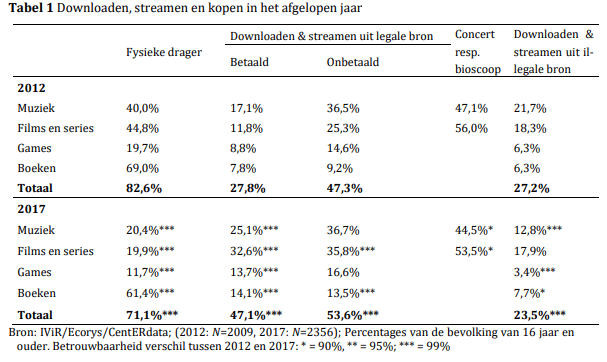
Piracy statistics can be tricky. Trends often go in different directions, depending on the region, the type of media, as well as the research timeframe.
One of the most elaborate datasets collected in recent years comes from the University of Amsterdam.
Among other things, it suggested that legal options are a better way to beat piracy than enforcement.
The underlying data forms the basis of a new research article where two nearly identical piracy surveys from 2012 and 2017 were compared. This allowed the researchers to look at changes in media consumption and piracy habits among the Dutch public over the years.
The respondents were asked about both legal and unauthorized consumption of music, movies and TV, games, and books. One of the overall findings was that between 2012 and 2017 the interest in physical goods plummeted.
For example, the number of people who bought physical music carriers was slashed in half to 20% and for movies/TV the decline was even more pronounced, falling from 45% to 20%. Physical books saw the smallest drop, with 60% still buying real books, down from 69%.
This trend coincides with a massive boost in digital sales. The number of people who bought digital entertainment increased across all categories, nearly tripling for movies and TV, which is likely due to Netflix. That’s a positive sign for the entertainment industries, which is also reflected in the piracy frequencies.

The survey found that the percentage of people who still download or stream content from unauthorized sources decreased for nearly every category. This effect is most significant for music and games, while movie and TV piracy remained relatively stable.
The only category for which the piracy rate went up was Ebooks. Between 2012 and 2017 the number of Ebook pirates increased from 6.3% to 7.7%, which is marginally significant.
According to the researchers, this shows that these book pirates are missing something in the current legal offering. A good subscription service for example, where people can access an unlimited number of books for a fixed price.
“Looking at the other markets, access-based subscriptions appear to be the most promising, where a large increase in the number of transactions compensates a lower average return per transaction,” the researchers write.
While not mentioned in the article, the massive increase in Ebook consumers may also play a role in the increased piracy rate. The number of people who bought Ebooks, and thus have e-readers, increased by 80% between 2012 and 2017.
Part of this new e-reader userbase apparently showed an interest in pirated books as well, which likely impacted the piracy rate. With that in mind, the piracy increase is relatively modest.
The research also looked at various pirate demographics and how these changed over time. This shows that between 2012 and 2017, women started to pirate more books and fewer games and music. These changes are more pronounced than for men.
In addition, the data reveal that, overall, less educated people pirate less. This is the case across all categories but the biggest difference can be found in the books category.
If anything, the findings show that generic statements about piracy rates and the average pirate are relatively meaningless. It is the finer detail that helps us to understand what’s really happening.
The present survey data shows that physical media is quickly losing popularity as more people consume legal content digitally. At the same time, piracy rates are dropping significantly for music and games, at least in the Netherlands, while Ebook piracy slowly increases.
—
A copy of the paper (in Dutch) titled “Polderpiraten voor anker” written by Joost Poort, Martin van der Ende, and Anastasia Yagafarova is available here.





